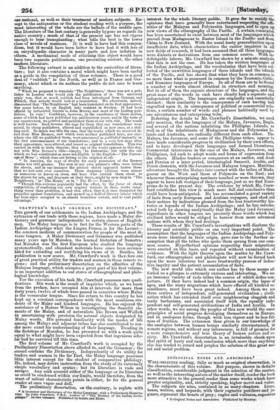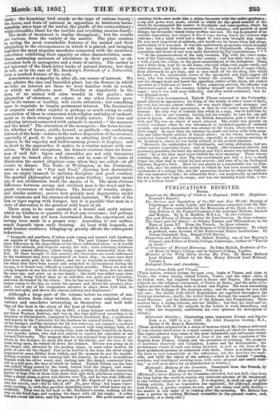ZOOLOGICAL NOTES AND ANECDOTES. * WELL-SELECTED reading, fully as much as
original observation, is the characteristic of this volume. But purpose, shown in definite classification,. considerable judgment in the selection of the matter, as well as the interesting nature of the matter itself, render the book more attractive to- the general reader than some works which have, greater originality, and, strictly speaking, higher merit and value.
The subjects are nine, contained in as many chapters: Lions, bears; wolves, and leopards, with their cognates panthers and ja- guars, represent the beasts of prey ; eagles and vultures, rapacious
* Zoological Notes and Anecdotes. Published by Bentley: birds ; the humming- bird stands as the type of curious beauty ; the horse,. and feats of national in opposition to histrionic horse- manship, are a type of the useful, the giraffe of the extraordinary ; while crocodiles stand for the terrible and revolting saurian family. The mode of treatment is similar throughout ; but the results are various, from the variety of the matter. The plan consists in noting the most remarkable features of the animal and their adaptation to the circumstances in which it is placed, and bringing together the most singular anecdotes connected with the creatures, sometimes exhibiting their sagacity or other characteristics, some- times embracing accounts of adventure in their pursuit, or ob- servation both in menageries and a state of nature. The author is not ignorant of the black-letter books of natural history., but they do not, as in the case of Mr. Broderip's Notebook of a Naturalist, form a marked feature of the work.
Association or sympathy is, after all, our source of interest. We may admire the rare and beautiful plant., but the flowers in which we take an interest are those we were familiar with in youth, or which we cultivate now. Novelty or singularity in the form of an animal will raise wonder in the gazers ; nice adaptation of structure, or colour, or any other feature pecu- liar to its nature or locality, will excite attention; but something more is requisite to inspire permanent interest. The fascination of serpents and other reptiles is perhaps as much owing to early association of ideas, in. connexion with religion and tales of enchant- ment as to their strange forms and deadly nature. The true and enduring interest connected with animals is mental—" the manners and the mind." The attraction of the menagerie—the home favour- ite, whether of house, stable, kennel, or paddock—the enchaining interest of the book—relates to the native disposition of the creature, especially if good, to its quickness in adapting itself to circum- stances, to the sagacity and half-reasoning powers it displays, and in short to the approaches it makes to a similar nature with our- selves. With. few exceptions, the fiercest creature loses its fierce- ness if well fed : tigers and crocodiles are not only innoxious bat may be tamed after a fashion; and in some of the tanks of ILindostan the sacred alligators come when they are called—at all events to dinner. The Duke of Wellington, in the Peninsula, wrote a homily on "Pay and Feed," showing how destructive was an empty stomach to military discipline and good conduct The martial philosopher might have gone further : regular meals are, if not civilization itself, the means of it. The most obvious difference between savage and civilized man is the fixed and fre- quent recurrence of meal-times. The history of wrecks, sieges, and similar mattere proves how quickly man degenerates under short-commons and the absence of social restraint. We talk of the lion or tiger raging with hunger, but it is possible that man in a state of starvation is the greatest wild beast of all.
There seem to be some ;min-oils of a brutal and surly nature which no kindness or quantity of food can overcome ; but perhaps the truth has not yet been ascertained from the experiment, not having been made in a- proper way. According to our author, much depends upon early training. At least with leopards, as with human creatures, bringing-up greatly affects the subsequent behaviour.
." Leopards and panthers, if taken quite young and treated with kindness, are capable-of being thoroughly tamed. The poet Cowper describes the great difference in the dispositions of his three celebrated hares: so it is with other wild animals, and leopards among the rest; some returning kindness with- the utmost affection,. others being rugged and untameable from the first. Of those brought to this country, the characters arc much influenced by the treatment they have experienced on• board ship : in some cases they have been made pets by the sailors, and are- as tractable as domestic cats ; bet when they have been teased and subjected to ill-treatment during, the voyage, it is found very difficult, to render them sociable. There are now six young leopards in one den at the Zoological Gardens: of these, five are about the same age, and gnaw up as one family ; the sixth was added some time after, and, being looked upon as an intruder, was quite sent to Coventry, and even ill-treated by the others : this he has never forgotten When the keeper comes to the den, he courts his caresses and shows the greatest plea- sure ; but if any of his companions advance to share them with him, he growls and.spits, andshowa the utmost jealousy and displeasure."
Although a large part of the volume before us consists of ma- terials drawn from other writers, there are some original obser- vations and anecdotes interesting in themselves and well told. One of the best is the story of the bear at Oxford.
"On a certain memorable day in 1847, a large hamper reached Oxford, Per Great Western Railway, and was in due time delivered according to its direction at Christchurch, consigned to Francis Buckland, Esq., a gentleman well known in the UniversitYfor his fondness for natural history. He open- ed the hamper, andthe moment the lid was removed, out jumped a creature about the size of an English sheep-dog, covered with long shaggy hair, of a brownish color. This was a young bear, born on Mount Lebanon, in Syria, a few months before, _who had now arrived to receive his education at our learned-University. The moment that he was released from his irksome at- titude in the hamper he made the most of his liberty, and the door of the room being open, he Clished. off down the cloisters. Service was going on in the chapel, and, attracted by the pealing• organ, or some other motive, he made at once for the chapeL Just as he arrived at the door, the stout verger happened to come thither from within, and the moment he saw the impish- looking creature that was running into his domain, he made a tremehdous flourish with his silver wand, and, darting into the chapel, ensconced him- self in a tall pew, the door of which he bolted. Tiglath Pileser (as the bear was called) being scared by the wand, turned from the chapel, and scam- pered frantically about the large quadrangle, putting to flight the numerous parties of dogs who in those days made that spot their afternoon rendezvous. After a sharp chase a gown was thrown over Tig, and he was with difficulty secured. During the struggle, ho got one of the fingers of his new master into his mouth, and—did he bite it off? No, poor thing f but began vigor- ously sucking it,, with that peculiar mumbling noise for which bears are re- markable. Thus was he led back to Mr. Buckiand's rooms, walking all the Way on his hind:legs, and sucking the finger with all his might. A collar was put round big neck,. and. Tig. became & prisoner. His goodenature and amusing tricks aeon made him a prime favourite with the under-graduates; a cap and gown were made, attired in which (to the great scandal of the dons) he accompanied his master to breakfasts and wine-parties,. where he contributed greatly to the amusement of the company, and partook of good things; his-favounte viands being muffins and ices. He was in general of an amiable disposition, but subject to fits of rage, during which his violence was extreme ; but a kind word and a finger to suck soon brought him round. He was most impatient of solitude, and would cry for hours when left alone, particularly if it was dark. It was this unfortunate propensity which brought him into especial. disfavour with the Dean of Christchurch, whose Greek quantities and hours of rest were sadly disturbed by Tig'a lamentations. • • • " At the commencement of the long vacation, Tig, with the other mem- bers of the University, retired into the country ; and was daily taken out for a walk round the village, to the great astonishment of the bumpkins. There. was a little shop, kept by an old dame, who sold whip-cord, sugar-candy, and other matters; and here, on one occasion, Tig was treated to sugar-candy. Soon afterwards he got loose, and at once made off for the shop, into which he burst, to the unutterable terror of the spectacled and high-capped old lady, who was knitting stockings behind the counter. The moment she ' saw his shaggy head and' heard the appalling clatter of his chain, she rushed up-stairs hi a delirium of terror. When assistance arrived, the offender was discovered seated on the-counter. helping himself most liberally to brown sugar ; and it was with some difficulty, and after much resistance, that he
was dragged away. • •
" When term recommenced, 'Heath- Meser returned to- the University, much altered in appearance, for being of the family of silver bears of Syria, his coat had become almost white ; he was much lugger and stranger, and his teeth had made their appearance, so- that he was rather more difficult to manage : the only way to restrain him when in a rage; was to hold him by the ears ; but on one occasion, having lost his temper, he tore his cap and gown to pieces. About this time the British Association paid a visit to Ox- ford; and Tig was an object of much interest. The writer was present on. several occasions when he was introduced to breakfbst-parties of eminent savants, and much amusement was created by his tricks, albeit they were a' little rough. In more than one instance he made sad havoc with book-mus- ling and other fragile articles of female attire; on the whole,. however he conducted himself with great propriety, especially at an evening meeting at Dr. Daubeny's, where he was much noticed, to his evident pleasure. "However; the authorities at Christchurch, not being zoologists, had pe- culiar notions respecting bears; and at length, after numerous threats and pecuniary penalties, the fatal day arrived, and Tig's master was inffirmed, that either he or the bear must leave Oxford the' next morning.' There was no resisting this, and poor dear- Tig was accordingly put into a box—a much larger one than that in which he had arrived—and sent off to the ZoOlogical Gardens, Regent's Park. Here he was placed in a comfortable den by him- self; but, alas ! he missed the society to which he had been accustomed, the excitement of a college life, and the numerous charms by which the Univer- sity was endeared- to him ; he refused his food ; ran perpetually uyand down his den in the vain hope to escape, and was one morningfound dead, a vic- tim to a broken heart."



























 Previous page
Previous page